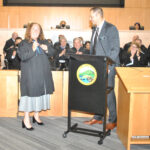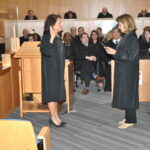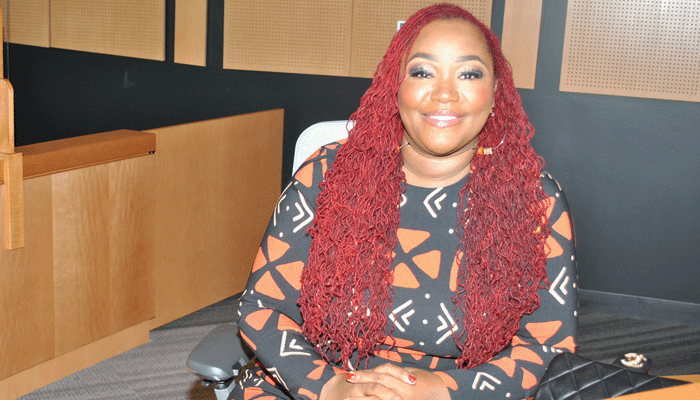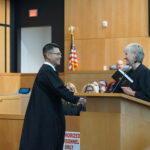All Rise: Reflections from Newer Judges
Have you ever wondered what it would be like to transition into the role of Superior Court Judge in Contra Costa County? I polled some judges appointed over the last three years for their thoughts on the job so far. Thank you to Hon. Jennifer Lee, Hon. H. Glenn Kim, Hon. Ayana K. Young, Hon. Palvir K. Shoker, Hon. Gina Dashman, and Hon. Peter Chang for openly sharing their sentiments. Their reflections may surprise you!
Let’s start with something fun: Please describe your favorite part of the job so far.
 Judge Jennifer Lee: One of my favorite parts of the job is the interaction with the public, which includes all the parties and the jurors. I have learned so much from their backgrounds and experiences that has helped me grow as a judge and a person.
Judge Jennifer Lee: One of my favorite parts of the job is the interaction with the public, which includes all the parties and the jurors. I have learned so much from their backgrounds and experiences that has helped me grow as a judge and a person.
Judge Ayana Young: I love this job. Really, I do. On Sunday nights, I feel at ease about my work week because I enjoy the work so much. One of my favorite parts is helping families. I’m in a family law assignment and I am grateful to be a part of so many families resolving their issues. I see many families two or three times after a Request for Order is filed and it brings me so much joy to see them come together, forgive, and let go of pain and resentment to co-parent successfully.
 Judge Gina Dashman: I love everything about the job so far, including the people I work with. The lawyers who work incredibly hard, and the juries. It is an honor to do what we do, and I never lose sight of that fact.
Judge Gina Dashman: I love everything about the job so far, including the people I work with. The lawyers who work incredibly hard, and the juries. It is an honor to do what we do, and I never lose sight of that fact.
Judge Peter Chang: I have enjoyed researching the law and arriving at the correct legal decision after applying the law to the facts.
Judge Palvir Shoker: My favorite part of the job is being able to interact with litigants. I feel that I can do more to help litigants and their families when I hear from them directly during our pro-per calendars, and I am able to explain to them how the process works and the reasons for my ruling.
Judge H. Glenn Kim: This is truly a wonderful job. I am blessed and grateful. One of my favorite parts is hearing both sides of an argument. I enjoy seeing how strategic some parties are and how the other side responds. I appreciate out-of-the-box arguments, and how parties connect the dots of what originally appeared to be random facts.
Another favorite part is coming to work with my co-workers, court staff and judicial colleagues alike. It’s a misnomer that this is a lonely job. Our court staff are dedicated, hardworking individuals – they are just good people. I also appreciate the generosity, friendship, and mentoring of my judicial colleagues. We engage in thoughtful discussion about the law, our judicial responsibilities, our families, and we truly support one another.
Please describe an unexpected challenge to the job.
 Judge Young: Hands down, night warrant duty. I remember watching movies where the police officer would go to the judge’s house in the middle of the night to get a warrant signed. It was cool in the Bad Boys movies, but in real life it definitely presents a challenge to my sleep. Thankfully we don’t have nighttime duty very often throughout the year, but because it’s such a challenge to my sleep, the dread can overtake my mood some days even if it’s scheduled a year out. When the time does come though, I realize it’s not as bad as I was making it in my head, but it’s such a relief when it’s over.
Judge Young: Hands down, night warrant duty. I remember watching movies where the police officer would go to the judge’s house in the middle of the night to get a warrant signed. It was cool in the Bad Boys movies, but in real life it definitely presents a challenge to my sleep. Thankfully we don’t have nighttime duty very often throughout the year, but because it’s such a challenge to my sleep, the dread can overtake my mood some days even if it’s scheduled a year out. When the time does come though, I realize it’s not as bad as I was making it in my head, but it’s such a relief when it’s over.
Judge Shoker: I usually joke that I was not prepared for the sleeplessness of the week of Night Warrant and Emergency Protective Order Duty. There is no amount of coffee that can make one alert and clear headed by the third straight night of interrupted sleep.
 Judge Kim: As a new judge, it’s not easy to see judicial colleagues with over a decade or more of experience and to think of them as peers. It took me some time to get comfortable with calling my colleagues by their first names and not by the title “Judge.” It has been a challenge to always keep in mind that no matter how many years of judicial experience one has, we are all equals and independent judicial officers. Navigating through that and coming to know that ultimately, my decisions are my own and no one else’s, have been challenging.
Judge Kim: As a new judge, it’s not easy to see judicial colleagues with over a decade or more of experience and to think of them as peers. It took me some time to get comfortable with calling my colleagues by their first names and not by the title “Judge.” It has been a challenge to always keep in mind that no matter how many years of judicial experience one has, we are all equals and independent judicial officers. Navigating through that and coming to know that ultimately, my decisions are my own and no one else’s, have been challenging.
Judge Chang: I didn’t expect judges to take work home so often! Many judges work evenings and weekends to keep up with their busy dockets.
What challenges do you look forward to as you grow in your role as a judge?
Judge Dashman: I love the question because it assumes that a judge’s role is inevitably full of challenges, which it is! The challenge I look forward to most is developing myself more expertly as a criminal judge. Coming from a civil background, the world of criminal law was entirely new to me. Eight months in, I realize I have learned so much and yet there is so much more to learn. I look forward to that challenge.
Judge Young: The challenges I look forward to as I grow in this role as a judge are being exposed and learning other areas of the law, and learning how I can better serve the community. Family law is my first assignment, and I have a background in family law. I believe this helped me feel more comfortable than if I started with a criminal assignment as a new judge. However, even with that comfort level, my judicial style is constantly evolving as I learn and become more familiar in my role. Adding other areas of law to that evolution presents an exciting journey that I am looking forward to. I also look forward to expanding my role in the community. One saying I use in my courtroom when I’ve made all the orders I think a family needs is, ‘I hope I don’t see you again unless it’s in the grocery store.” I think it’s important that judges serve where they live. This helps create the connection of community and empathy needed for a successful legal system. I’m hoping to contribute to the successful legal system we have in this county.
Judge Shoker: I look forward to learning different areas of law that I did not have experience with before joining the bench, and really studying like a 1L during the first semester of law school.
Judge Chang: Judges on this bench often rotate through different assignments in vastly different areas of law. I look forward to continuing to learn new areas of law and stretching my legal knowledge and experience.
Judge Lee: I am looking forward to future assignments that will bring new opportunities to learn different areas of the law.
Judge Kim: I look forward to the challenges of learning about new areas of law, but mostly, I look forward to the challenge of helping to mentor and develop the next generation of attorneys and soon to be judges. When I was first appointed, an experienced, seasoned judge took me out to lunch, one on one. She wanted to ensure that I had the resources to start off well, to get to know more about me, and to share her experience on the bench. That kind, personal gesture meant so much to me and I will be forever grateful. It can be challenging to pass it forward and directly guide and mentor the next generation. We must leave our comfort zone and be a part of shaping our future. So, I look forward to leaving a legacy of not only being fair and impartial, but of being remembered as a mentoring judge who was proactive in our community and helped to instill pride and respect in our judiciary.
What would you encourage an attorney interested in joining the bench to do to improve their chances of being appointed?
Judge Shoker: My take on this question might be a little different than most people are used to for judicial appointments. This is a public service position, so the sooner a candidate starts living it the better their approach will be to this position. If you are already giving your time and skills to our community by volunteering work and giving back, then the appointment just becomes a formality where now you are doing the same work but with a title. I encourage attorneys considering the bench to get involved with the bar association and to understand the needs of our community. I would strongly encourage you to volunteer as a Pro Tem Judge or a Settlement Mentor so you can learn more about the role.
Judge Dashman: Let me first say that there is not one path to joining the bench. You ask any judge about their path to the bench, and it will be different than everyone else’s. There is no doubt that working hard at what you do is a given. Being involved in the community and participating in bar functions (especially the CCCBA – plug, yes) is a great way to meet people naturally and engage in public service. I think volunteering for the courts is another good way to demonstrate interest and commitment. There are many opportunities!
Judge Kim: To those that want to join the bench, first, learn about the process. The application alone can seem daunting. Before putting pen to paper, print and read it in full. Speak with other applicants, recently-appointed judges, and your peers. Get a sense of what your reputation is, the areas you may need to develop, and what mentors you can seek out for guidance. I would especially encourage those that have exclusively practiced in one or two areas to join their local bar, such as the CCCBA. The CCCBA gives those applicants a chance to network with other legal professionals beyond their specialties. I was personally involved with the Alameda County Bar Association (ACBA) and got to know many lawyers and judges who ultimately supported my judicial application. But for the ACBA, I would never have gotten to know those who practiced in other areas of law. Network with those that have a say in your application process, i.e., members of the bar, sitting or retired judges, community leaders, and politicians. I did not start the process knowing one politician, but I got to know people, who knew people, and so on. I would surmise that anyone who seeks help in joining the bench will soon find out that the initial reaching out may have been the most difficult part of the entire journey.
Judge Young: I would encourage an attorney interested in joining the bench to always be intentional about how they present themselves to other attorneys and judicial officers. Of course, the work ethic should speak for itself but also how one treats others is just as important. I believe people will remember someone who was not only prepared in court, but also treated them and others with respect and kindness. A judge is a servant to the community, so this position of authority must also be had with humbleness. I believe an attorney interested in joining the bench would act in a way where their peers would vouch for them to have those qualities.
Judge Chang: Involvement with the bar and community is a factor that the Governor’s Office considers. But for it to matter, the attorney should truly be involved in the organization and not simply be involved in name only to fill the resume.
What words of wisdom do you have for members of the CCCBA?
Judge Lee: The work you do matters and makes a difference in the lives of those you serve.
Judge Chang: Be courteous and respectful to opposing counsel, the court staff, and the court. And I always appreciate attorneys who meet and confer on issues before raising them with me.
Judge Kim: Know your judge, ask your colleagues, Google them. Better yet, look them up on the CCCBA website, which is a great resource containing most of the judges’ profiles. I’m always impressed with attorneys that have done their homework and come to my courtroom knowing my background, courtroom policies, and expectations of decorum. My biggest tip for young attorneys is to develop, cherish, and guard your reputation, both as a professional and as a person. Great attorneys have reputations that go beyond which side of the courtroom they stand on. They have integrity, subject matter expertise, are reasonable, respectful, and know how to issue-spot. Great attorneys are zealous advocates who understand that an adversarial process does not need to be a hostile one.
Judge Shoker: We are very fortunate to have an active bar association in our county, so get involved, meet other attorneys, and just always be polite and civil to each other in court. Do not buy into the whole narrative that if you are civil to the opposing side, you are not being aggressive. A great lawyer can be an outstanding advocate and a polite human being at the same time.
Judge Young: CCCBA does a great job of keeping attorneys and the public informed. I often check the website for information myself. As far as tips for practice in my courtroom, meet and confer before you get to court, and remember to be civil towards one another and to the parties.
Thank you again to our judges for participating. Please check out the magazine online for an extended interview.